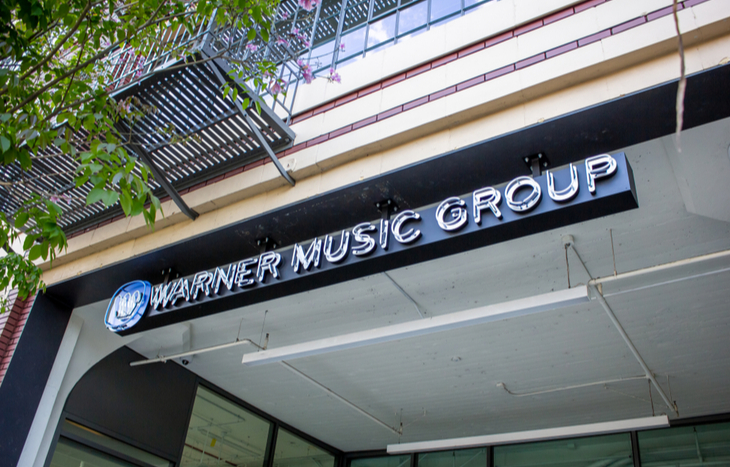Warner Music Group Announces IPO for New Investors

Ten years ago, the rise of technology started turning the music industry upside down. Issues such as piracy caused labels to struggle. But thanks to subscription streaming services, such as Spotify and Apple Music, the industry is making a comeback. Earlier this month, investors saw proof of that when a report revealed Warner Music’s IPO details.
Warner Music IPO: The Business
Warner Music Group, or simply Warner Music, is an American entertainment and record label. It has labels such as Atlantic, Elektra, Reprise and Parlophone. The company’s music publishing firm, Warner Chappell Music, has over 1.4 million copyrights across all genres. Warner Music is one of the “big three” recording companies behind Universal Music Group and Sony Music Entertainment. Some of its talent includes Ed Sheeran, Bruno Mars and Camila Cabello.
In 2004, Time Warner sold Warner Music Group to Edgar Bronfman Jr. and his fellow investors for $2.6 billion. Then, in 2005, Bronfman took the company public. It traded on the New York Stock Exchange until 2011.
Warner Music suffered from the industry’s struggle to switch to digital. CDs became less popular as iPods and computers became capable of downloading and storing music. It created an opportunity for billionaire Len Blavatnik’s Access Industries to buy the company for $3.3 billion in 2011. It’s been a private company ever since.
Why is Warner Music Group Going Public now?
On February 6, 2020, the company filed a Form S-1 with the Securities and Exchange Commission. It revealed details on Warner Music’s planned IPO. Investors also think this move was inspired by rival label Universal Music Group (UMG). UMG sold 10% of the company to China-based Tencent, valuing it at $33 billion. That’s a big increase from its $23.5 billion value in 2017.
But just as UMG has grown, so has Warner Music. While the company didn’t announce share details, the financial numbers look pretty good. In the first quarter ending December 31, the company reported sales of $1.26 billion and a net income of $122 million. That’s a 42% increase year over year.
Warner Music has consistently increased yearly revenue. In 2017, the company pulled in $3.58 billion. Then sales increased to $4.01 billion in 2018 and $4.48 billion last year.
This growth is a reflection on the music industry. According to the Los Angeles Times, “The U.S. recorded music industry continued to grow in the first half of 2019, according to a September report from the Recording Industry Association of America… Industry-wide revenues grew 18% to $5.4 billion in the first six months of the year. Streaming generated 80% of sales.”
Warner Music was the first major music company to report its largest source of revenue from streaming services back in 2016.
Unlike a few companies that recently had high-profile IPOs, Warner Music has proven to be profitable. However, investors are concerned that may not be the case down the road…
Warner Music’s IPO Faces Rising Industry Costs
A company can’t profit without incurring costs. And in the music industry, one huge cost is artist and repertoire (A&R). Warner Music breaks this down as… “(i) paying royalties to recording artists, producers, songwriters, other copyright holders and trade unions; (ii) signing and developing recording artists; and (iii) creating master recordings in the studio.”
Since 2014, Warner Music’s A&R costs increased a total of 4%. In 2014, A&R expense was 28.7% of annual revenue. In its 2019 fiscal year, the expense was 32.7%. Each percent represents $36 million. If costs had remained at 28.7%, the company might have saved $144 million.
Currently, this isn’t a large issue for a Warner Music IPO. Although the A&R costs are increasing, Warner Music’s revenue is more than keeping up.
A&R costs grew to a total of $453 million, but the company’s recorded music revenue grew to $1.01 billion. So long as Warner Music is able to keep that kind of revenue growth, rising A&R costs shouldn’t worry investors.
However, the issue may come up a few years down the road. While most of Warner Music’s income comes from streaming services, analysts speculate that this growth is going to slow.
A Rolling Stone report claimed, “Warner is now opening itself up to the stock market on the cusp of an era when a global streaming-growth slowdown seems inevitable, and is only getting more pronounced.”
In the company’s S-1 form, it claims paid streaming services can still increase in the U.S. and Western Europe. It also points out China as a potential growth area. The country had 33 million paid subscribers in 2018. That’s only 2% of total population. Warner Music also believes that new technologies, such as smart speakers, will increase demand globally for these services.
When Will Warner Music Group IPO?
The company has not announced a launch date for its IPO. So we’re not sure when to expect it. It could take months. The IPO process isn’t easy. And although Warner Music hasn’t set a pricing range, the company has set a standard $1 million value hold.
If you’re interested in finding more investment opportunities, sign up for our free e-letter below. Our team of experts provide daily tips and news for both beginners and experienced investors.
This is likely just the beginning of the music industry’s return. If Warner Music’s IPO is as successful as investors hope, we can expect to see other companies follow suit.






